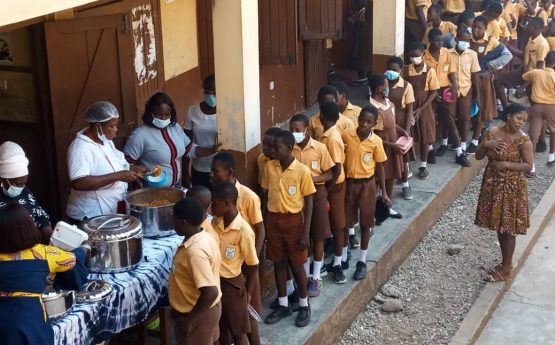ActionAid Nigeria is asking everyone involved in education and food programs to help communities take more control of the Home-Grown School Feeding Programme (HGSFP) by using locally sourced food.
They said the program should focus especially on women and farmers so that it can continue successfully over time.
The Country Director of ActionAid Nigeria, Mr. Andrew Mamedu, spoke about this on Friday in Abuja during the group’s National Policy Forum.
The forum’s theme was about how to make the Home-Grown School Feeding Programme a regular part of government policy, to help grow the economy and include more people financially.
Mamedu explained that the program does more than just feed children—it helps keep them in school and supports their learning.
He also said it boosts local farming and food businesses, reduces hunger and inequality, and supports economic and social development.
Mamedu added that the program is a smart way to invest in people and the country’s future, as it helps build a stronger and more stable society.He said if the program becomes a permanent part of government planning, it will improve children’s nutrition and learning, create jobs, increase access to banking, and help future generations thrive.
He shared that during the last government, the program made real progress.
For example, more children started attending school—school enrollment went up by 28%, and more than half stayed in school longer in many states.
Across Nigeria, about 7 million children in 40,000 public schools received daily meals. Many cooks and small farmers were also hired to support the program.
These results show how feeding programs can help bring children into school and connect education with local economic benefits.
Mamedu encouraged all levels of government—federal, state, and local—to think long-term and help build a school feeding program that lasts and benefits everyone.
He also suggested that money for the program should come regularly from national funds and education commissions, with help from strong partnerships.
Mamedu noted that between 2018 and 2022, the number of children in basic education rose from 35 million to 40 million.
But he also pointed out that the number of children not in school grew from 9.1 million in 2000 to 14.6 million in 2020.
He said Nigeria’s low score of 0.36 on the World Bank Human Capital Index means a child born today will only reach 36% of their full potential if things don’t improve.
Right now, over 45 million children in Nigeria can’t read a simple sentence at age 10, and about 15 million are not in school at all.
He said this isn’t because people aren’t trying, but because of poor management, not enough funding, and broken systems.
Mamedu repeated that ActionAid supports the government’s school feeding program, calling it a strong solution to help fix problems in education and nutrition.
He said the forum was held to share the results of a study that looked at the political and economic issues affecting the program and suggested ways to improve it by involving local communities more.
The event brought together leaders from government, civil society, development organizations, and others to agree on a way forward and create a working group to help guide the program.


